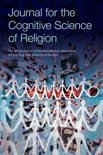
Journal for the Cognitive Science of Religion
Scope & Guideline
Decoding the Cognitive Foundations of Spirituality
Introduction
Aims and Scopes
- Cognitive and Evolutionary Approaches to Religion:
The journal emphasizes research that applies cognitive science and evolutionary psychology to understand religious beliefs and practices, exploring how these elements evolve and manifest in human behavior. - Rituals and Their Cognitive Underpinnings:
A core area of focus involves the cognitive mechanisms behind rituals, including their social functions, psychological impacts, and evolutionary significance, as well as how rituals foster group cohesion. - Embodied Representations in Religious Experience:
The journal addresses the embodied nature of religious experiences, examining how physical sensations and perceptions influence and shape an individual's understanding of the divine. - Interdisciplinary Perspectives:
It encourages interdisciplinary research that combines insights from anthropology, psychology, neuroscience, and philosophy to provide a comprehensive understanding of religion from a cognitive standpoint. - Lexical and Semantic Studies in Religion:
The exploration of language and its role in religious cognition, including how specific words and phrases can prime cognitive responses related to spirituality and divine concepts.
Trending and Emerging
- Cognitive Neuroscience of Religious Experience:
There is a rising interest in exploring the neural correlates of religious experiences, with studies examining how brain activity relates to spiritual feelings and divine encounters. - Embodied Cognition in Religion:
The concept of embodiment is becoming increasingly relevant, as researchers investigate how physical experiences and sensations inform religious beliefs and practices. - Algorithmic and Information Theory in Religion:
Emerging discussions around the application of algorithmic thinking and information theory to understand religious cognition suggest a modern approach to analyzing how humans process religious information. - Social Dynamics of Rituals:
Recent publications are showing a trend towards exploring the social dynamics of rituals, particularly how they influence group behavior, social cohesion, and individual psychological well-being. - Cognitive Templates and Religious Cognition:
Research into cognitive templates—mental structures that shape how individuals understand and relate to religious concepts—has gained prominence, reflecting a deeper exploration of cognitive frameworks in religious contexts.
Declining or Waning
- Neolithic Religiosity Studies:
Research specifically targeting Neolithic religious practices seems to be less emphasized in recent publications, possibly due to a broader shift towards contemporary cognitive studies over historical analyses. - Generalized Theories of Religion:
There is a noticeable decrease in papers that propose broad, generalized theories about religion, as the journal appears to favor more specific, empirical studies grounded in cognitive and evolutionary frameworks. - Traditional Religious Textual Analysis:
The journal seems to be moving away from in-depth textual analysis of traditional religious scriptures, focusing instead on cognitive and experiential aspects of religion.
Similar Journals
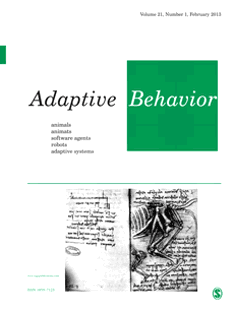
ADAPTIVE BEHAVIOR
Illuminating the Pathways of Adaptive Behavior ResearchADAPTIVE BEHAVIOR is a renowned academic journal published by SAGE PUBLICATIONS LTD, dedicated to advancing the understanding of adaptive mechanisms in behavior across a spectrum of disciplines. With a focus on Artificial Intelligence, Behavioral Neuroscience, and Experimental and Cognitive Psychology, this journal aims to facilitate the dissemination of innovative research and theoretical advancements that relate to adaptive behaviors in both humans and artificial systems. The journal, which spans from 1992 to 2024, holds a commendable position within its field, ranked in the Q3 category for multiple categories, and Q1 in Philosophy. Furthermore, it is recognized within Scopus rankings, ensuring its impact and relevance in the academic community, with a notable rank of #57 in Experimental Psychology and #49 in Behavioral Neuroscience. While ADAPTIVE BEHAVIOR does not currently offer Open Access options, it maintains a vital role in bridging disciplines and fostering discourse among researchers, professionals, and students who are exploring the complexities of behavior in adaptive systems.

European Journal for Philosophy of Religion
Nurturing Scholarly Conversations on Belief and ThoughtEuropean Journal for Philosophy of Religion is a distinguished platform dedicated to advancing critical discourse in the fields of philosophy and religious studies. Published by the European Journal Philosophy Religion, this journal serves as an essential resource for scholars interested in exploring the intricate relationship between philosophical inquiry and religious thought. With an impressive 2023 Scopus Ranking, positioning it in the 80th percentile for Religious Studies and 69th percentile for Philosophy, the journal reflects a robust academic influence in its fields. This UK-based publication, operating out of the University of Innsbruck's Institute of Christian Philosophy, offers a Q3 category ranking, indicating its significance in ongoing scholarly discussions. Although currently not open access, the European Journal for Philosophy of Religion provides valuable insights and is a critical venue for researchers, professionals, and students who are eager to engage with contemporary philosophical debates surrounding religion.

INTERNATIONAL JOURNAL FOR PHILOSOPHY OF RELIGION
Navigating the Intersection of Ethics and BeliefThe INTERNATIONAL JOURNAL FOR PHILOSOPHY OF RELIGION, published by Springer, is a leading journal dedicated to the rigorous exploration of philosophical inquiries related to religion. Since its inception in 1970, the journal has fostered critical discourse and interdisciplinary research, facilitating dialogues on fundamental questions about belief, ethics, and the nature of divinity. With an impressive 2023 Scopus ranking of 189 out of 806 in the Arts and Humanities category, placing it in the top 76th percentile, this journal is recognized for its scholarly impact and relevance in the field. The journal maintains a prestigious standing as a Q1 journal in Philosophy, making it an essential resource for researchers, professionals, and students seeking to engage with contemporary debates and historical perspectives in the philosophy of religion. Although it does not offer open access, the journal's contributions are invaluable for shaping future inquiry and understanding in this vital area of study.
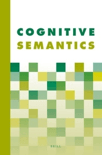
Cognitive Semantics
Unraveling the Mind Behind LanguageCognitive Semantics, published by BRILL, is a leading academic journal dedicated to the intricate study of cognitive processes underlying language use and semantic meaning. With its ISSN 2352-6408 and E-ISSN 2352-6416, this journal contributes significantly to the fields of linguistics and language studies, reflecting its importance in contemporary research on cognitive linguistics. Over its publication span from 2015 to 2024, it has established a niche as a Q3 ranked journal in the Linguistics and Language category for 2023, showcasing its relevance and growing influence in the academic community. Although currently not open access, the journal aims to provide a robust platform for exchanging ideas, theories, and methodologies related to cognitive semantics, fostering interdisciplinary dialogue among researchers, professionals, and students. Readers can expect to uncover valuable insights into the cognitive mechanisms that shape our understanding of language, making this journal an essential resource for anyone involved in linguistic research.
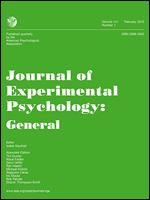
JOURNAL OF EXPERIMENTAL PSYCHOLOGY-GENERAL
Transforming Knowledge in Experimental PsychologyJOURNAL OF EXPERIMENTAL PSYCHOLOGY-GENERAL, published by the American Psychological Association, is a leading journal in the field of experimental and cognitive psychology. With an ISSN of 0096-3445 and a robust impact factor that reflects its significant contribution to research, this journal serves as a premier outlet for empirical studies that advance our understanding of psychological processes across development and cognition. Covering a wide array of topics from developmental neuroscience to general psychology, it is categorized in the Q1 quartile across multiple fields, making it a vital resource for researchers, professionals, and students alike. The journal has maintained a consistent publication record since its inception in 1975, continuously freeing insights that shape the future of psychology and related disciplines. With rigorous peer review and high standards of scholarly excellence, JOURNAL OF EXPERIMENTAL PSYCHOLOGY-GENERAL remains an essential platform for disseminating innovative psychological research.

Phenomenology and the Cognitive Sciences
Advancing Interdisciplinary Insights in Human UnderstandingPhenomenology and the Cognitive Sciences is a leading interdisciplinary journal published by Springer, dedicated to exploring the intersections of cognitive science and phenomenological philosophy. Since its inception in 2004, this journal has established itself as a vital resource for researchers and scholars, achieving Q2 status in Cognitive Neuroscience and Q1 in Philosophy according to the 2023 Category Quartiles, highlighting its significance in both fields. With an ISSN of 1568-7759 and an E-ISSN of 1572-8676, the journal provides a platform for innovative research, fostering insightful dialogues that bridge the gaps between cognitive processes and human experience. Its current Scopus rankings place it in an impressive 97th percentile for Philosophy and 59th percentile for Cognitive Neuroscience, reflecting its academic impact. Although not an open-access journal, researchers and students can access its rich repository of articles to deepen their understanding of how cognitive science informs philosophical inquiry and vice versa, making it an indispensable tool for anyone committed to advancing knowledge in these vital areas.

JOURNAL OF COGNITIVE NEUROSCIENCE
Exploring the neural pathways of thought.Welcome to the JOURNAL OF COGNITIVE NEUROSCIENCE, a premier publication in the field of cognitive neuroscience, published by the esteemed MIT PRESS. Since its inception in 1989, this journal has been at the forefront of advancing our understanding of the neural mechanisms underlying cognitive processes, boasting an impressive convergence period through 2024. With its Q1 ranking in the 2023 cognitive neuroscience category, it stands out among 115 peers, indicating its critical role in shaping contemporary research. The journal offers a comprehensive array of research articles, reviews, and methodologies aimed at researchers, professionals, and students alike, facilitating the exploration of complex cognitive functions. While not an open-access journal, it provides essential insights and significant contributions to the neuroscience community, making it an invaluable resource for anyone keen on delving into the intricacies of the human brain.
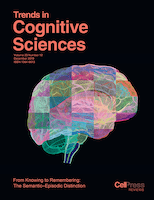
TRENDS IN COGNITIVE SCIENCES
Illuminating Complex Cognitive ProcessesTRENDS IN COGNITIVE SCIENCES, published by CELL PRESS, stands as a premier platform for the dissemination of high-quality research in cognitive neuroscience, experimental psychology, and neuropsychology. With an impressive impact factor and consistently placed in the Q1 category across multiple dimensions of cognitive research, this journal not only ranks in the top tier of its fields—holding the 1st position in both Cognitive Neuroscience and Neuropsychology but also boasts an exceptional percentile ranking of 99. As it converges from 1997 to 2024, it reflects the evolving landscape of cognitive sciences, making it a vital resource for researchers, professionals, and students seeking to stay updated on influential trends and groundbreaking studies. Though not an open-access journal, TRENDS IN COGNITIVE SCIENCES offers readers access to a wealth of information that shapes our understanding of complex cognitive processes and behaviors.

Journal of Cultural Cognitive Science
Shaping the Future of Cultural Cognitive ResearchThe Journal of Cultural Cognitive Science, published by SpringerNature, is an esteemed forum for researchers and scholars dedicated to exploring the intersection of culture, cognition, and language. With its ISSN 2520-100X and E-ISSN 2520-1018, this journal has made significant strides since its inception in 2017, covering a wide array of topics pertinent to Experimental and Cognitive Psychology and Linguistics and Language. Notably, it has achieved remarkable recognition, ranking in the Q3 category for Experimental and Cognitive Psychology and Q1 for Linguistics and Language in 2023. Its Scopus ranks further illustrate its impact, with the journal positioned at the 89th percentile in Social Sciences - Linguistics and Language and 47th percentile in Psychology. Despite its ongoing journey, it continues to foster open dialogue and innovation among professionals, researchers, and students, providing valuable insights and advancing knowledge in the field.

Journal of Empirical Theology
Bridging Faith and Empirical InsightJournal of Empirical Theology, published by BRILL, stands as a leading forum for scholarly discourse in the field of religious studies, boasting an impressive Q1 ranking in 2023. With a legacy that spans from 1988 to 1994 and again from 2010 to 2024, this journal offers critical insights and empirical research that bridge theology and the broader social sciences. The journal fosters interdisciplinary dialogue, encouraging contributions that explore the practical implications of theological concepts on contemporary issues, appealing to researchers, professionals, and students alike. While it is not an open-access publication, the Journal of Empirical Theology provides an essential platform for innovative ideas and methodologies, contributing significantly to the academic landscape in the Netherlands and beyond. Whether examining the nuances of religious practice or engaging with theoretical frameworks, this journal plays a vital role in advancing our understanding of the dynamic interactions between faith, culture, and society.